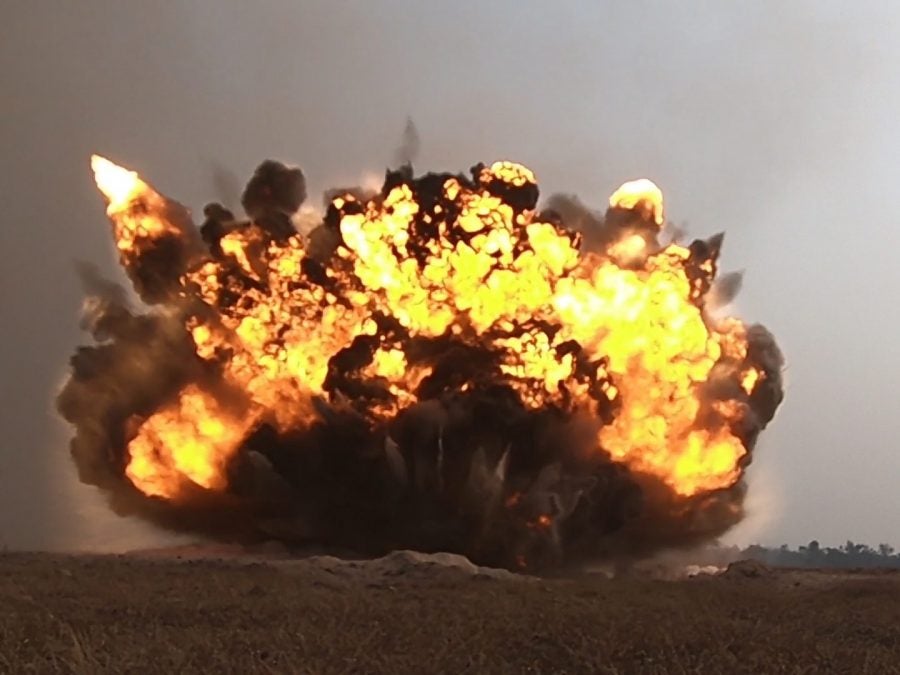
Last week, US President Donald Trump rescinded policy governing the use of anti-personnel landmines (APL) in favour of a new US landmine policy to be overseen by the Department of Defence (DoD).
Previously, rules meant that the US was restricted from using APLs outside of the Korean peninsula. Under the new rules combatant commanders in ‘exceptional circumstances’ can employ anti-personnel mines.
A White House statement on the decision said: “As part of President Donald J. Trump’s steadfast commitment to ensuring our forces are able to defend against any and all threats, the President has cancelled the Obama Administration’s policy to prohibit United States military forces from employing anti-personnel landmines outside of the Korean Peninsula.
“The Department of Defence has determined that restrictions imposed on American forces by the Obama Administration’s policy could place them at a severe disadvantage during a conflict against our adversaries. The President is unwilling to accept this risk to our troops.”
The decision the White House said was part of Trump’s ongoing ‘rebuilding’ of the US military and part of the administration’s plans “to give our military the flexibility and capability it needs to win.”
However, the rollback of regulations will likely not make much of a difference to the way the US approaches conflict, according to Royal United Services Institute Land Warfare Fellow Jack Watling.
Watling told Army Technology said: “If we think about how we fight, landmines are not a central part of our doctrine. The US has not signed the convention on landmines because it has a number of potential static defences that it sees as requiring landmines to deny ground, Korea being the most obvious example.
“Removal of the restrictions on commanders using them is an interesting one because there hasn’t really been a request from services or military commanders to employ landmines, and I don’t think we’re going to see them employed.
“Not least for the reason I mentioned, that in most of the fights that we’re looking at today, we prioritise mobility and our opponents are usually defending static areas and therefore they don’t have mobility problems that we would try and inhibit.”
Land mines are most often used as a means of denying movement to ground forces by blocking off large areas of the battlefield; this has the benefit of slowing an adversary’s movements and funnelling them into areas where artillery or other fires can be used to engage them from a distance.
Watling explained: “If you are manoeuvring across a front and you hit minefields, you are going to essentially bunch into the areas where the mines are not, and move faster through areas that are not mined, which means that you can then be shaped and moved into areas that can be targeted with artillery and crossfire and so forth.
“It’s a way of shaping how people move across the battlefield. It’s very effective; however, there are a number of downsides. The first from a military point of view is that it also denies your own movement and you don’t necessarily know when you’re going to be needing to cross ground again. “Battlefields are pretty fluid places and so, in that sense, they are also a counter-mobility inhibitor of your own manoeuvre.”
For large and mobile militaries like that of the US, the ability of the force to use speed and flexibility while engaging an enemy force means that closing off access to large areas of the battlefield can become counter-intuitive.
Ahead of the public release of the decision last week, US Secretary of Defence Mark Esper said: “I would just say this much; landmines are one of very many other important tools that our commanders need to have available to them on the battlefield, to shape the battlefield and to protect our forces.
“At the end of the day, we want to make sure that we have all the tools in our toolkit that are legally available and effective to ensure our success and to ensure the protection of our soldiers, sailors, airmen and Marines.”
The DoD later said that despite the decision to give commanders more flexibility to use landmines, the US is still dedicated to global demining efforts and that the policy decision will not lead to a reduction in US demining efforts or ‘exacerbate’ the problem of unexploded munitions.
Performing the duties of Assistant Secretary of Defense for Strategy, Plans and Capabilities, Vic Mercado said: “The Department of Defense’s new policy allows planning for and use of APL in future potential conflicts, including outside the Korean Peninsula, while continuing to prohibit the operational use of any “persistent” landmines [landmines without a self-destruct/self-deactivation function].
“Under this policy, if combatant commanders authorise the use of landmines in a major combat situation, those landmines will include the aforementioned safeguards that will prevent them from being a threat to civilians after a conflict ends.”
The decision from the US falls into a wider trend from the Trump administration of moving some military decisions away from the President and to the lower levels of the military and fits with the administration’s move to pull away from other international conventions on military matters.
Watling explained: “There’s also been a persistent pattern in the Trump administration to delegating authorities to combatant commanders, so they no longer operate a kill list, managed by the National Security Council for UAV strikes. That’s pushed down to combatant commanders.
“There were a whole range of things. The use of cluster munitions is something that they have pushed down again to theatre commanders and so I think this is consistent with the general trend that they haven’t signed anything saying they won’t use them. And from Trump’s point of view, he prefers to leave these decisions at a lower level of command.”



